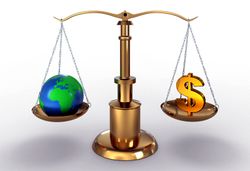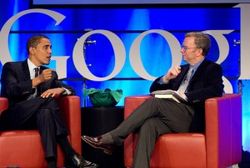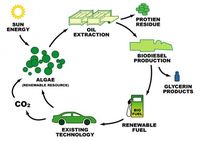Think of this as Volume 17, Number 7 of A-Clue.com, the online newsletter I've written since 1997. Enjoy.
The following is going to annoy my
liberal friends, but hear me out.

political thesis, which is a collection of myths and values driving
power, the point at which you go from winning elections to winning
them for a generation, comes when business moves to your side.
You don't need all of business. You
only need the rising tide of business to be on your side, that
element of business driving economic growth.
Without significant
business support, your side of the political world is always swimming
upstream. That's because the business of America is business, even
its political business is business, and anyone who questions that
doesn't know America. (This Rising Tide is a restaurant in Scarborough, Maine. We hear good things about the lobster.)

within the American economy is a big challenge to the President and
his party. The opportunity exists to capture that rising tide, once
and for all, to achieve political dominance for the rest of my life
and most of yours.
The way to do that is with a carbon
tax. By addressing the climate crisis with a carbon tax, you actually
do two things other than just address the climate crisis. You offer a
solution to our continuing deficit problem, and you put yourself
decisively on the side of future abundance, namely renewable energy. (The picture illustrates an explanation of the carbon tax from Rice University, my alma mater. Some wise old birds roost there.)
One of the great lies of American
history, something nearly all liberals believe deep in their hearts,
is that business is inherently conservative. It's not. Today's
Republican Party is conservative, and today's Republican Party
captured the early technologists, along with Hollywood, to become the
dominant political philosophy from 1968 to 2008.

dominated the previous generation were Democrats – most of the
“best and brightest” around Kennedy came from a consumer
manufacturing background. (Speaking of Rice, here is Kennedy at Rice Stadium pushing for the Apollo Program.) They wanted programs that increased demand
– the Great Depression represented a shortfall in demand, one that
only World War II could fully address.
For two generations before that, the
Republicans were the liberal party, the Democrats the conservatives.

Progressive movement of John Sherman, William McKinley and Theodore
Roosevelt because manufacturers – the rising tide – wanted stable
input prices, which regulated monopolies and industries
centrally-controlled by bankers like J.P. Morgan gave them. It was
Republicans who fought the Rockefeller oil monopoly, even though
Rockefeller himself had been a liberal donor to the Republican cause.
They did it in the name of stable input prices, without which mass
manufacturers like Henry Ford could not grow.
Business interests also supported
Republicans in the previous generation's crisis, because
manufacturers wanted protective tariffs, which the South opposed.

have long gravitated to this theory of the war, and it's true in its
way, that it was about the tariff. But that was politics. The economic struggle between North and South was between man
and machine. It's no accident, as I've said before, that the John
Henry character, the steel-driving man who died beating a machine,
one of the great “heroes” of 19th century America, is
always described as a black man. That was the essential economic
struggle of the age, and it was one that no man, willing or
unwilling, slave or free, could win. The machine age, the rising
tide, was the liberal side of the 19th century political
argument.

political history probably occurred in late 2007, when then-Senator
Barack Obama spoke at a “Google Town Hall”
.
It was a friendly get-together, a love-fest, and the Senator was even
fed one of the key answers by an admiring Google CEO Eric Schmidt. (The picture is from the Koch-funded Heartland Institute, and the article behind it is very whiny.)
Asked a complex question about databases, Obama said that “a bubble
sort would not be the way to go,” a little bit of jargon that
endeared him to the room. And if you look again at the history of
that campaign, the Obama political machine was a networked computer,
a giant database, a Google big enough so that a bubble sort really
wasn't the way to go in organizing it.
The alliance between Barack Obama and
new tech, symbolized by Google, has extended into other areas of
technology. Look at 3D printing or “making,” look at robotics,
look at cloud computing, look at renewable energy, and you're going
to find a lot of executives who are supporters of this President and
(increasingly) his party. Democrats win in Silicon Valley, and
wherever these business interests dominate the political landscape.
They may say they're moving over social issues, the interests of the
“Creative Class,” but they're going to demand, increasingly,
policies that are friendly to their business interests. And it makes
sense to give them these policies.
Where is the political danger? Can this
be overthrown? In the near term, it can be.

currently driving the U.S. economy forward and our trade deficit
downward comes from Republican interests.l
It's oil, and natural gas, obtained through fracking, that is the
first stage of our coming prosperity. It's the fat part of the rocket
now coming off the launching pad.
The Republican Party is owned, lock,
stock and barrel, by the petroleum industry. That industry's switch
from the Democratic era of Lyndon Johnson to the Republican Era of
George Bush is the big political story of the late 20th
century. The failures of the last decade were the oil industry's
failures. But fracking is replenishing oil's political coffers, the
Citizens United decision allows that money to be spent, and as we saw
last year it is being spent. That is the current danger. Call Karl
Rove “Turdblossom” all you want, but he's the primary conduit for
oil industry money in politics, and money still matters.
The President needs a countervailing
business force to stand against this financial tide. That's
technology. That's renewable energy. And the best thing he can do for
renewable energy today is to fight for a carbon tax, as a way to
reduce the deficit.

renewables is assured. The cost of solar energy is already falling
below the cost of other forms of grid energy. Biofuels need the kind
of boost that only a carbon tax can deliver. Wall Street has been
working on carbon market programs for some years, and while they may
appear to be objecting strongly to a tax geared toward growing that
market they can work with it – they can make money with it.
Fighting for a carbon tax,
simultaneously reducing the deficit and our carbon footprint can,
along with natural gas exports, continue to fuel economic growth
while renewables scale up to meet our needs, and those of the world,
slowing global warming and even, in time, reversing it.
A carbon tax is an obvious political
move. It will be seen as liberal, it will be portrayed as being
anti-business, but it's really aimed at securing a new political
future, a future in which business stands with liberals, as it did
before the Nixon era, and where the dominance of liberal politics
becomes assumed.











Given the far rightward turn of the Republican party and their unpatriotric suicidal intransigence, perhaps the only way carbon taxes will come in time is is the considerable paranoia of the Tea Party is channeled for good. The more the word goes out that carbon taxes are a fait accompli, the only real question being what to do with the revenues, the quicker they will come into being. For the only question will be: not whether to have a carbon tax, but what to do with the revenues. Do we want to give entitlements to undeserving preschoolers, fund the technological fantasies of futurists, give demand-generating dividends to individual citizens or pay of the deficit?
Given the far rightward turn of the Republican party and their unpatriotric suicidal intransigence, perhaps the only way carbon taxes will come in time is is the considerable paranoia of the Tea Party is channeled for good. The more the word goes out that carbon taxes are a fait accompli, the only real question being what to do with the revenues, the quicker they will come into being. For the only question will be: not whether to have a carbon tax, but what to do with the revenues. Do we want to give entitlements to undeserving preschoolers, fund the technological fantasies of futurists, give demand-generating dividends to individual citizens or pay of the deficit?